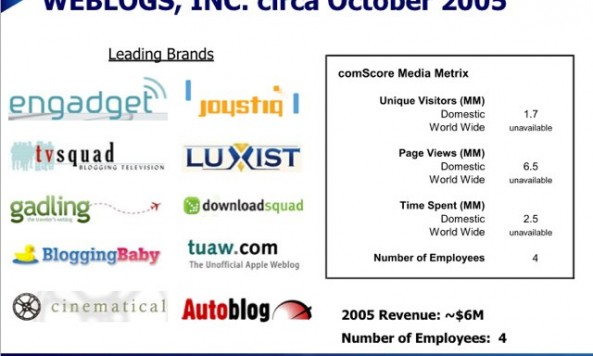First off an apology for not posting. Traveling, flu, visitors in town, and you know running/bootstrapping/killing myself for Bloguin. I always think it’s funny when blog posts start off with this kind of apology, as in many cases nobody really noticed/gave a shit. I’d like to think some people do here.
In this blog I’m going to tackle one issue, the value of platform. Yes, platform, the biggest buzz word there is but I’m not going to futz around. Instead I am going to extensively put my thoughts here and get your feedback as it seems in the not so distant horizon myself and Bloguin will have some decisions to make here with some additional resources internally coming into play.
When a content focused startup takes a round of funding there are only really three areas they can invest that capital. Sure the founders probably want a salary, a work phone, maybe a real office, etc, but the real bulk of that funding is going to go towards a) content b) technology/platform c) monetization optimization.
Investing in content could mean buying sites, hiring writers, paying writers more, or potentially working on distribution (newsletters, mobile, content partnerships), or advertising of that content.
Monetization optimization could mean hiring an in house sales team, working on new revenue streams, or sophisticating your ad operations.
There are pitfalls going down either road. Companies can overpay writers and overpay for sites or even adopt the wrong content production compensation model.
On the monetization front, I’ve seen and heard a lot of failed attempts to increase sales. Folks who moved up the ranks at CNN, ESPN, Yahoo, and other major media companies get the itch to take an elevated position at a younger company and the company is in need of a connected individual to increase revenue. Unfortunately these individuals are expensive and more importantly they have no idea what they’re getting into. Imagine you sold ads for cnn.com for 2000-2007. Your phone rang with interested parties looking to purchase advertising as a lot of your sales were inbound and repeat.. Relationships were easy to forge. You had budget to wine and dine, to travel, marketing support, in house design/marketing/etc. Now you’re at something like early stage Huffington Post or something that’s not even close to mainstream. The phone is not ringing and the people who used to fill your 401k with comission money is a little weary of telling their boss that they want to stop buying ads on cnn.com and move to this new property. 
Suddenly people don’t know who your company is and you start looking around and realize you’re at a company of dozen or so 20 somethings wearing tee shirts and you wonder “What the hell was I thinking?”. I’ve litterally seen and heard of this exact scenario over a dozen times with the average tenure of these “hired guns” lasting 4-8 months. It can be even worse as one hired gun will often bring in others who are of the same ilk. Now you have 3-5 high earning employees who are in over their head.
Sorry for the detour and back on point. So what about investing in platform? I’m about to dive into that, but I got to say it’s an interesting question. How valuable is platform?
On one hand you have SB Nation, Gawker, Weblogs, Scout, Rivals, 24/7 Sports, Bleacher Report and to a lesser degree Yardbarker all with proprietary platforms. How much of their value is derived from those platforms?
On the other hand you have the Y! Sports Blogs, NBC “Talk” blogs, TechCrunch all building their online empires on WordPress and sites like Huffington Post using Movable Type. All of these examples are using free or low priced outsourced platforms. TechCrunch and Huffington Post were acquired for about $350 million and niether even blinked at developing their own CMS. TechCrunch rather tried to make it’s own tablet computer instead of a platform.
Below is a look at some of the startups that have gone down the platform road.
Weblogs- The idea behind this post actually came from a couple of developments surrounding Weblogs, the blog network acquired by AOL for $25 million in 2005. At a recent conference, AOL’s current CEO was on stage gushing about how they’ve been working on enhancing the Weblog platform. It’s almost a scape goat for many companies. What have we been working on? Oh the platform or “the plumbing” as Armstrong kept saying. Basically stuff you can’t see.
In the crowd was Brian Alvey, one of the co founders of Weblogs who let out an interesting tidbit about the acquisition of Weblogs. Apparently AOL bought the sites and content first and then there was a second transaction months later for the actual platform. Very odd. Migrating content is never pretty. I don’t know what AOL was thinking at the time acquiring only half the equation. Alvey has actually been leading a new platform company, Crowd Fusion.
Also in the crowd was Jim Bankoff, CEO of SB Nation one of the main guys behind both transactions from the AOL side who would later tweet something to the effect that his bosses were skeptical of the second transaction (the platform one). AOL was now gushing about the Weblog technology. Times had changed from their skepticism to their new stance of embracing/investing in the platform.
But apparently that Weblog technology wasn’t as improved as Armstrong was selling it at the conference as weeks later the editorial team from their very popular Engadget blog announced they’d be leaving AOL for SB Nation, citing the platform.
“We have been working on blogging technology that was developed in 2003……After looking under the hood of what they (SB Nation) have in terms of technology, we’re very excited about what we will be able to do there.”
Frankly speaking I’m not sure how much of that was marketing on behalf of SBN/a parting-shot at AOL versus reality. There were strong rumblings that Engadget refused to work along side TechCrunch under AOL and with new editorial directions at first from “The AOL Way” and later the Huffington Post’s incoming management, you could surmise that their exit might have not been just been due to an inferior platform.
But regardless if you believe Engadget’s outgoing comments about the Weblogs platform or Armstrong’s comments that its been improved under his leadership, the fact remains that they built a proprietary platform that helped power their content. AOL fell in love with the content and later the platform and use it to this day. Building in house worked for them and Alvey thinks he can do it again but this time without the added responsibility of developing content internally.
Scout, Rivals, 24/7
I wrote quite the magnus opus about Rivals, Scout, and 24/7, companies that share the exact same model and even founders. What I found most interesting about that article besides the huge amount of traffic it got was the really interesting comments that came from people who worked for those companies including the engineers. They detail how the company blew through millions and millions of dollars in venture capital and chronicle some of the personalities who they contend nearly ruined those companies.
What was most interesting is that some contend that they would have been better off building their platforms on open source technology. Others chime in that those days (1999-2002), it would be possible but back then open source platforms were pretty crummy and it would have never really worked.
Both Scout and Rivals are considered successes selling for 60 and 100 million respectively to Fox and Yahoo, but in reality they burned through so much venture capital both were almost washes.
Fox still uses Scout’s technology to this day and I hate to be an ass, but it’s just very very dated. It works, but it just screams 2005.
Yahoo still uses Rivals’ technology and it’s better, especially in terms of design although it’s been quite awhile since it’s added any functionality.
The guys who bought Rivals out of bankruptcy and sold it Yahoo have since started 24/7 who are in the midst of building their own platform. A lot of folks aren’t happy with the platform compared to the smorgasbord (dear god you should have seen how bow I misspelled that at first) of solutions that publishers used before moving over to 24/7. I actually see a lot of good work being done comparative to the stale Scout and Rivals platforms but have to say there is a long ways to go before it’s clear they have the best platform.
Should 24/7 reach the size of Scout and Rivals, it will be interesting to see what happens to that company as Fox and Yahoo already own viable competitors. CBS, AOL, ESPN, or Comcast/NBC perhaps could pull the trigger to acquire the network and the technology. Very interesting to keep an eye on but it should be noted that I don’t think 24/7 would exist if Yahoo continued to invest in the Rivals platform like the founders would have preferred. Rivals seemed to become less of an emphasis technology wise for Yahoo and now you have that most of the original team working in the same building doing the same thing as Rivals but just at a new company. They’re basically Michael Scott Paper Inc but with a good track record.
Gawker Media
Gawker has their own platform and it’s got quite a bit of ink about their redesign. For a massive content company, you rarely hear rumblings of Gawker maybe getting looked at to get acquired but some of their PR of late has focused on their platform, potentially as selling point to a major media company.
One thing that sticks out about Gawker’s platform and technology is that it really doesn’t look or feel like anything else out there while other companies tend to share some traits. It’s hard to tell if their commitment to proprietary platform will in the end help their bottom line and possible exit or if they same type of success could have been achieved by outsourcing their platform or adopting an open source/free platform. Probably the hardest company to add commentary around.
Bleacher Report
This one is a bit different as they’re a destination portal and not a network of sites. Their installation of their technology is one site and not multiple sites. They’ve certainly been successful with their own technology as their slideshows, trivia, article viewer, editing tools, newsletters, and SEO have all been instrumental to their growth.
But I think their value is a bit different. Other examples on this list can been deployed on new sites with much ease, but I think Bleacher Report’s technology is more valuable in parts rather than as a whole. Sure a big company could buy them and setup the same technology on a site called let’s say “couch potato report” but I just don’t see it working like that (similar to ballhype being mirrored with showhype once they were acquired).
Bleacher Report took so much attention that I don’t think you could just take the technology and see success in another niche. You’d need to invest millions of dollars (mostly on manpower) to have a chance at similar success. The technology would help but it’s not really feasible to scale it out to tons of sites and expect similar results or replace existing sites with their proprietary technology stack.
Instead I think the value is in the various segments of that stack of technology. Could a media company utilize their slideshows or newsletters on existing properties? Probably after some custom integration hence there is good value in the parts individually which drives the value for the whole platform.
SB Nation
For years, SB Nation ran off of a system called Scoop, mainly because one of their founders ran a popular political blog on that same platform. But then Scoop basically shuttered, a more common problem then you realize.
Very often companies kill products, the company themselves go under, or the open source development community erodes to where the platform is no longer being worked on. Having worked in software I can tell you that a lot of potential customers were only looking at new options because they somehow picked something that was no longer viable.
Scoop was a dead platform. SB Nation was looking for something else and here is where there is some mystery. You can find some crumbs on the web of their team looking for new solutions and then the trail goes cold and months later they rolled out their own technology platform. That’s not an easy task.
What’s interesting there is at the time they were like Bloguin is now, a bootstrapped entity or at least that’s the story you see publicly. What I’ve heard is that Jim Bankoff who was no longer with AOL and still being bullish on platforms helped lead an angel round of financing to the young company, a round of funding that doesn’t seem to be publicly divulged.
With that funding a technology team was put in place. They hit a home-run on the platform, the publishers loved it, more funding came, Jim Bankoff came in as CEO, and that seems to be sequence of events of how a bootstrapped company with no proprietary technology became the juggernaut it is now.
Again I’ll rewind by saying that this is a good chunk of conjecture here, but that’s the story I’ve put together connecting dots and if true, it’s impressive.
The fact that Bankoff and the technology team really set the tone and direction for the company before a major funding was quite a successful bet. Almost like that 4 team parlay you never hit.
Yes their platform and design has continued to evolve, but a huge chunk of their success can be traced back to that early decision which seems ages ago.
It’s still not clear just how much of their valuation they point to their platform being responsible for nor what price an acquiring company would put on that technology. Given the technology is now deployed on ~300 sites and you have the Engadget team singing it’s praises, I’d imagine it will continue to be a big part of their value proposition when the time is right to sell down the road.
Yardbarker
Yardbarker focused a lot of it’s capital in content and monetization but actually put together a very capable technology team as well who seemed to focus on smaller projects rather than a huge platform. An athlete blog platform was developed as well as a system to tag articles and a Digg like community voting platform.
Yardbarker did unveil an overhauled platform for athlete blogs and for general bloggers in early 2009. Unfortunately some of the technology team would subsequently leave the company soon after.
Athletes adopted the platform and some at large bloggers did as well although it seemed to struggle to get mainstream traction. If you think I’m painting this as failure, you’d be surprised. Fox purchased Yardbarker and after some time Fox began to adopt the Yardbarker content platform.

In the end while the platform didn’t necessarily become a huge driver of business independently for Yardbarker, it seems as if Fox is getting a lot of mileage out of the technology today.
So Why Is This A Hard Decision?
These stories all came in different years over the last decade plus. Some were huge successes others not so much. When you build in house, you have to build EVERYTHING.
Your own RSS feed system, your own login system, your own comment system, security systems (Gawker got pillaged FYI), your own mobile site versions, etc. etc. It’s not just building a blog platform but dozens of other auxilary features and technologies which can be tricky and or expensive.
Nowadays you have startups focused on almost all of these features. Tumblr, Automatic, Posterous, Crowd Fusion, and many others make their own platforms. Disqus and LiveFyre are high quality commenting platforms. Open Source solutions exist that are highly competitive as well and given your ability to develop on top of these platforms so it can be possible to customize your way to a polished product instead of building from scratch.
If it was easy, Yahoo, NBC, TechCrunch, and Huffington Post wouldn’t have thought twice about whipping something up. But it’s not and if you swing and miss here and can cripple a company and potentially risk your job. There are a handful of companies I won’t name who tried to tackle platform, fell face first, and they’re dead or dying.
Also if you do build from scratch, you’re not making a short term decision but potentially almost even a lifelong decision. You’re going to need technology expertise for this platform as long as you have content on it and being created on it. You’re not going to build a car from scratch and then let the mechanics go. You NEED them and you need them for a long time.
To the folks who work or have worked at these companies, I’d love to get your thoughts here as we close in on having to evaluate resource allocation. Definitely no easy decision even for The World’s Greatest Chinese Jew who actually just defended his title on a competition versus a new worthy challenger who emerged.
What are the most important factors when deciding what to do here? What your board and advisors say? How much money you have? The quality of your technology team? The size of your digital imprint? How successful your current platform is? Probably all play a role, but I’m sure someone can provide some additional insight.
Leave a comment or feel free to email. You may just end up being on our advisory board.

